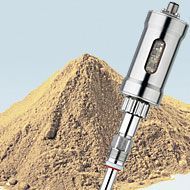 Successful manufacture of lysine relies on strict control of dissolved oxygen (DO). For one of the world’s largest lysine producers, switching to optical DO measurement has resulted in increased process availability and less maintenance.
Successful manufacture of lysine relies on strict control of dissolved oxygen (DO). For one of the world’s largest lysine producers, switching to optical DO measurement has resulted in increased process availability and less maintenance.
World production of lysine as an additive in animal feed has seen enormous growth since it was first introduced in the early 1960s. Estimates put current global production at 1.2 million tons with an annual increase of around 8%. Lysine is manufactured today almost exclusively by fermentation processes.
Leading producer
Our customer is one of the world leaders in the production of lysine and other amino acids as food additives for livestock. At their production facility in Brazil they employ METTLER TOLEDO measuring systems to monitor pH, redox, conductivity and DO throughout production.
Application
During fermentation the bacteria consume sugars and oxygen enabling them to produce the enzymes required for the fermentation process. The level of dissolved oxygen in the medium is crucial as too low a level results in anaerobic fermentation and hence the production of unwanted ethanol. It is not only a minimum concentration of dissolved oxygen that is important but also a maximum. If an optimum dissolved oxygen level is maintained, only the necessary amount of oxygen is injected into the reactor, with the advantage of lowering power consumption for air compressors.
Optical measurement
Amperometric measurement technology in the pharmaceutical industry is well established due to its broad application coverage. Nevertheless, over time there has been an increase in the demands on measurement systems to be more efficient, in need of less maintenance, to operate for longer periods between calibrations and be easier to use.
This led METTLER TOLEDO to develop a sensor that utilizes the process of fluorescence quenching to measure DO – the InPro6880i. A great advantage of this measuring technology is that determining DO levels is fast and precise. A further benefit of the InPro6880i is that no electrolyte or membrane is required. The absence of electrolyte means that liquid handling and the risks of wrong operation associated with it, can be forgotten.
Built-in intelligence
METTLER TOLEDO's extensive knowledge of the ever-changing requirements for increased performance and regulatory compliance in biotechnology led to the development of our Intelligent Sensor Management (ISM) concept. Measurement systems equipped with ISM monitor themselves for sensor wear and impaired performance. This enables users to make a real-time assessment of sensor state based on diagnostic tools such as the Dynamic Lifetime Indicator. Pre-emptive corrective maintenance can be performed on a sensor before initiating a batch, eliminating the potential for sensor failure during the process.
More process uptime
Though our customer was very pleased with the performance of the non-ISM InPro6800 DO sensor that they had been using, the advantages of greater process availability due to diagnostic tools, lower maintenance and recording of calibration convinced them to upgrade to the InPro6880i for DO measurement in lysine fermentation. The facility is now considering switching to ISM systems for pH measurement.